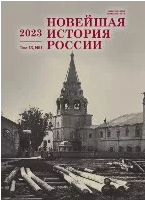Начальник концлагерей белого Омска Павел Николаевич Велижанин (1859–1942)
The Head of the Сoncentration Сamps in White Omsk Pavel Nikolaevich Velizhanin (1859–1942)
Author(s): Dmitry Igorevich PetinSubject(s): Civil Society, Diplomatic history, Local History / Microhistory, Military history, Political history, Social history, Pre-WW I & WW I (1900 -1919), Identity of Collectives, Peace and Conflict Studies
Published by: Издательство Исторического факультета СПбГУ
Keywords: Officers; military officials; First World War; Civil War; White movement; Soviet society; Omsk; repressions;
Summary/Abstract: The publication is a study into the life and professional path of Lieutenant Colonel P.N.Velizhanin — a regular officer, a participant of the First World War, decorated by six orders, who consecutively served in the Russian Imperial and White armies, and then in Soviet institutions. His biography, which has not been previously presented in the scholarship, vividly reflects the collisions of the era of social cataclysms. The research has been carried out on the basis of the theory of social adaptation, the anthropological approach and the historical and biographical methods as a methodological basis defining its genre. The article considers the issue presented in the article in connection with the historiography of the problem. The basis for the study was a complex of unpublished sources of an official nature discovered by the author in the funds of the Historical Archive of the Omsk Region and the archive of the Office of the Federal Security Service of Russia in the Omsk Region, among which of most significance were the track record of P.N.Velizhanin for 1919; Soviet questionnaires; investigative documents of the Cheka; materials of departmental office work related to military and special (Chekist) registration of the subject of the study in the 1920s. As a result, a controversial biography of P.N.Velizhanin is reconstructed with the highest level of detail. The conclusion emphasizes this officer’s relatively successful social adaptation in Soviet Omsk, whose military (and anti-Bolshevik) biography was complemented by the leadership of military penitentiary institutions. The publication may be of interest to a wide range of readers — to researchers into Russian military history, into Russian special services, into the Soviet society, into the repressive policy of the Soviet state, as well as to specialists in the field of practical genealogy.
Journal: Новейшая история России
- Issue Year: 13/2023
- Issue No: 42
- Page Range: 76-88
- Page Count: 13
- Language: Russian

